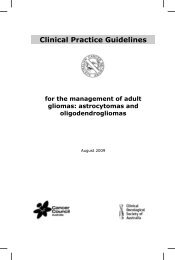Clinical Practice Guidelines for the management of locally advanced ...
Clinical Practice Guidelines for the management of locally advanced ...
Clinical Practice Guidelines for the management of locally advanced ...
You also want an ePaper? Increase the reach of your titles
YUMPU automatically turns print PDFs into web optimized ePapers that Google loves.
8 COMPLEMENTARY AND ALTERNATIVE (UNPROVEN)<br />
THERAPIES<br />
8.1 Definitions<br />
Complementary medicine<br />
Complementary medicine is any intervention that is used in conjunction with standard western health<br />
practices.<br />
Integrative medicine<br />
Integrative medicine is an approach that combines standard western health interventions and evidence<br />
based complementary medicines.<br />
For example: <strong>the</strong> use <strong>of</strong> a course <strong>of</strong> relaxation <strong>the</strong>rapy in conjunction with standard radio<strong>the</strong>rapy or<br />
chemo<strong>the</strong>rapy regime to reduce stress anxiety.<br />
Alternative medicine<br />
Alternative medicine is an intervention or product <strong>of</strong>fered as an alternative treatment to standard<br />
western medical practices.<br />
(Source: <strong>Clinical</strong> Oncological Society <strong>of</strong> Australia CAM Definitions www.cosa.org.au)<br />
The use <strong>of</strong> complementary and alternative (or unproven) medicine (CAM) has continued to increase.<br />
In 2004 it was reported that 52.2% <strong>of</strong> <strong>the</strong> Australian population used CAM. 1 In North America <strong>the</strong><br />
reported prevalence <strong>of</strong> CAM usage in prostate cancer lies between 18 and 45%. 2<br />
It is important that clinicians know about <strong>the</strong>ir patient's current and proposed CAM use as some CAM<br />
<strong>the</strong>rapies can interfere with o<strong>the</strong>r <strong>the</strong>rapies. However, a survey <strong>of</strong> patients using both conventional<br />
and complementary <strong>the</strong>rapies found that many patients do not in<strong>for</strong>m <strong>the</strong>ir doctor <strong>of</strong> <strong>the</strong>ir CAM use<br />
because <strong>the</strong>y were not asked and because <strong>the</strong>y did not see it important <strong>for</strong> <strong>the</strong> doctor to know. 3 To<br />
gain a comprehensive picture <strong>of</strong> CAM use and thus avoid possible adverse interactions it is important<br />
that all patients be carefully questioned as to <strong>the</strong>ir current or proposed usage <strong>of</strong> CAM agents in a<br />
supportive, understanding and non-judgmental way. 4, 5 Sch<strong>of</strong>ield et al 5 provides recommendations<br />
and suggestions on how to discuss CAM usage. Their systematic review revealed that <strong>the</strong>re is no level<br />
IV or higher evidence <strong>for</strong> communicating about CAM with cancer patients. As a result <strong>the</strong>ir<br />
recommendations are based on a systematic review <strong>of</strong> descriptive studies <strong>of</strong>, a review <strong>of</strong> generic<br />
communication skills and expert opinion.<br />
Recommendation<br />
Health pr<strong>of</strong>essionals should ask <strong>the</strong>ir patients about <strong>the</strong>ir use <strong>of</strong> CAM <strong>the</strong>rapies in a<br />
supportive, understanding and non-judgmental way.<br />
Grade D<br />
While <strong>the</strong>re have been numerous reports on <strong>the</strong> level <strong>of</strong> CAM usage in men with prostate cancer,<br />
<strong>the</strong>re are limited studies on <strong>the</strong> factors motivating <strong>the</strong>m to use it. One study 2 hypo<strong>the</strong>sised that users<br />
<strong>of</strong> CAM did not assess conventional and non-conventional treatments in <strong>the</strong> same way as non-users.<br />
CAM users perceived CAM to be safer than conventional treatments and showed greater concern <strong>for</strong><br />
side effects <strong>of</strong> conventional <strong>the</strong>rapy such as impotence. Non-users <strong>of</strong> CAM questioned its validity,<br />
perceived conventional care as ’curing‘ cancer and were more accepting <strong>of</strong> possible side effects such<br />
105<br />
Complementary and alternative <strong>the</strong>rapies



